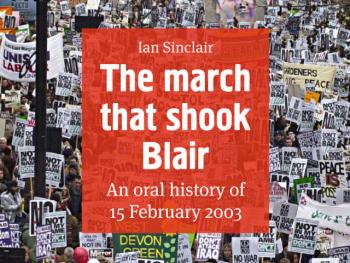 In 2003 the UK and US invaded Iraq without a UN resolution. This is common knowledge to anyone who was old enough to pay attention to the news at the time and the following years. Many in my generation also attended the anti-war marches that were organised not only in Britain but across the world, although the London march, attracting between one and two million people according to different estimates, was clearly the largest and attracted the most attention.
In 2003 the UK and US invaded Iraq without a UN resolution. This is common knowledge to anyone who was old enough to pay attention to the news at the time and the following years. Many in my generation also attended the anti-war marches that were organised not only in Britain but across the world, although the London march, attracting between one and two million people according to different estimates, was clearly the largest and attracted the most attention.
What may not be as common knowledge is what has happened in the years following the invasion and this was the topic of the event at University of Southampton on May 29th. The event brought together Matt Barr, a PhD student at the university who specialise in post-conflict decision-making focusing on Iraq, and Ian Sinclair, a freelance journalist and author of the book ‘The march that shook Blair: An Oral History of 15 February 2003’.
Matt who has travelled to Iraq on multiple occasions, including during the 10th anniversary of the invasion, spoke about his experiences there and the impact that the sanctions and the war has had on the people and their communities in Iraq. This could be simple things, like the story Matt told about how after a confrontation involving guns outside the house he was staying the neigbour’s young child knew that a bullet cartridge that has just been fired would be hot so did not pick it with their hands but instead used the cloth of their shirt to prevent getting burnt. Speaking to a mixed academic audience of undergraduates, postgraduates and professors these stories about the people Matt met out in Iraq showed a side to the war, and perhaps more importantly the aftermath, that we were all probably aware of, but knew little about in specific detail and about specific people.
Ian’s talk was focused more on the home front. Despite the march in 2003 against the war mobilising millions of people, in retrospect it has primarily been seen as a failure simply because it failed to stop the invasion. This is not only a view that has been portrayed in the media, but as Ian pointed out, it was also shared by some of the activists. However, in social movement studies scholars argue that an outcome of a social movement cannot be narrowly defined as only concerned with a certain political decision or the specific issue that they mobilise around. In fact they speak of multiple outcomes of social movements and their activities, such as for example raising awareness and support for the issue increasing the mobilisation potential in the future, which in turn gives the organisation more power in negotiations with decision makers. This shows that the outcomes of a social movement, and particularly a demonstration, are more complex than at first sight. And it may not happen straight away (1). Ian’s book and talk taps in to exactly these debates when he argues that the anti-war movement, and the instantiation of the support for the movement that the march symbolised, was influential at the time and has had long term impact on the greater political landscape. The argument is better summarised elsewhere, but the most important point to take away is that just because the decision was not stopped does not mean that the mobilisation was a failure nor futile.
Interestingly, but perhaps as a consequence of the mixed yet academic audience, the following questions and answer session focused around the effectiveness of different protest strategies and repertoires of protest action. Many of us had been there on the streets, standing up for something that we thought was wrong, and as Matt’s talk illustrated had many of the consequences we feared, but it still happened. It is easy to then give up and go home or move on to more radical means, as Ian pointed out that many of the anti-war activists had themselves done. Neither Matt nor Ian did go home, and that is why they are here and can tell the very important stories about what happened after our march and that it was not for nothing.
Emily Rainsford is a politics PhD student at the University of Southampton focusing on youth political engagement and social movements.
Notes
1.) For example see, Giugni, M. (1998) Was it Worth the Effort? The Outcomes and Consequences of Social Movements‟, Annual Review of Sociology, Vol. 24, 371-393; and, Costain, A. N. & Majstorovic, S. (1994) Congress, Social Movements and Public Opinion: Multiple Origins of Women's Rights Legislation, Political Research Quarterly, Vol. 47, 111-35.

